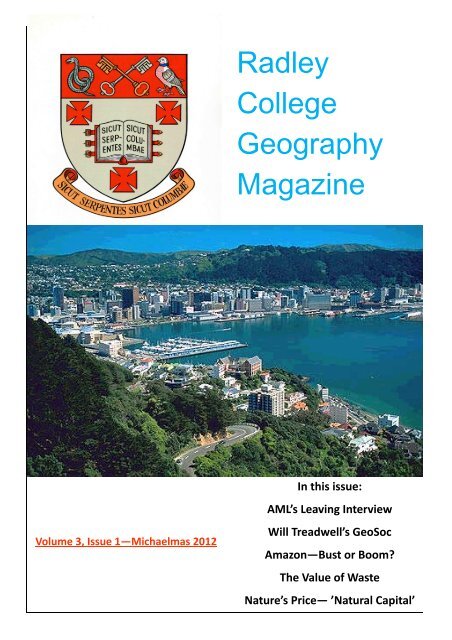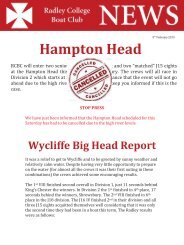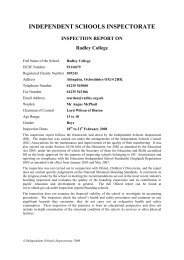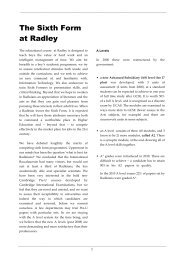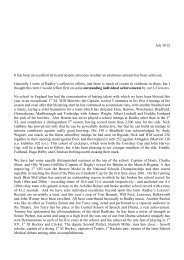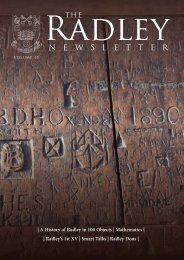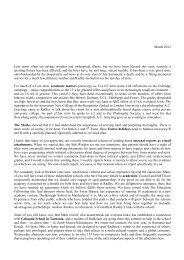Create successful ePaper yourself
Turn your PDF publications into a flip-book with our unique Google optimized e-Paper software.
<strong>Radley</strong><br />
<strong>College</strong><br />
<strong>Geography</strong><br />
<strong>Magazine</strong><br />
In this issue:<br />
AML’s Leaving Interview<br />
Volume 3, Issue 1—Michaelmas 2012<br />
Will Treadwell’s GeoSoc<br />
Amazon—Bust or Boom?<br />
The Value of Waste<br />
Nature’s Price— ’Natural Capital’
The Amazon: Boom or Bust?<br />
The Amazon is the largest Rainforest in the world and accounts for half the rainforest area<br />
of the planet. Many people imagine the Amazon as a swathe of unbroken green but in<br />
fact, it is steadily retreang due to cale ranches and illegal farms. But is it right to stop it<br />
and what are the effects of prevenng these acons?<br />
The Amazon is approximately 2 million square miles in area but already, 17% has been cleared by deforestaon. At<br />
the peak of deforestaon in 2004, an area of 10,274 miles was cleared, equivalent to the size of Albania, Hai or<br />
Belgium. But this land is being used incredibly producvely. Brazil is fast becoming the largest Soya Bean producer<br />
in the World as the deforested Amazon is converted into Soya fields. Brazils’ harvest next year will be, according to<br />
esmates, 85 Billion tonnes of Soya Beans. Why is deforestaon occurring for the sake of planng Soya?<br />
Farmers say the Economic incenves outweigh the illegal risks.<br />
The Local Agricultural associaon says that this is a ‘Golden<br />
Era,’ for Brazil; the price of Soya has risen 16.6% (from 60‐70<br />
reals [£21.50 a sack]) in the past 12 months. This is partly due<br />
to China rapidly developing and now able to afford greater volumes<br />
of food. Antônio Galvan, head of the Agricultural Associa‐<br />
on of Sinop, says greater land clearance is essenal if the<br />
world is to feed a growing populaon. In addion, the financial<br />
incenve to break the law increases with Soya prices. A farmer<br />
in Brazil says ‘Deforestaon is an internaonal concern, but we<br />
also have to make a living.’ So one could argue that farmers<br />
should have the right to clear the Amazon.<br />
However, what is rather sickly ironic is that the Soya Bean<br />
prices have mainly increased due to a drought that cut the<br />
harvest in the US this year, due to Climate change partly<br />
caused by deforestaon. As a consequence, there is further<br />
incenve to deforest and the Brazilian economy has<br />
capitalized. This incident that has occurred in areas across<br />
the world has given sciensts alarming evidence that the<br />
Amazon is caught in a vicious circle as the more this great<br />
climate regulator is cleared, the more the dramac impacts<br />
of Climate change will affect Global market Prices<br />
and Global Hunger.<br />
One can’t underesmate the importance of deforestaon to affect Climate Change. However, one cannot overlook<br />
the economic incenves of Brazil’s rich resources. But if you were a Brazilian farmer, what would you do?<br />
Jack Redley (e) ‐ 6.1
‘Beyond Oil’ - Lent Term Geographical Society<br />
T<br />
he geography society was privileged to hear from such an esteemed speaker as Will<br />
Treadwell (a). In his me at <strong>Radley</strong> he has not only won the geography prize twice but<br />
more recently has become the “President” of the Harris Society.<br />
Will began by presenng current issues regarding oil. Firstly he explained that there are diminishing resources, and<br />
in some countries such as the US in 1971 oil producon peaked. There is also the issue of an increase in demand for<br />
oil. This is because an ever increasing proporon of the worlds populaon is reaching the economic level at which<br />
they start to need their ‘share’ of world oil. This has been reflected in the news, as sources predict that world demand<br />
for oil is likely to rise by 21% by 2030.<br />
What are the opons aer our oil resources have been used? Will<br />
gave two soluons to the issue; first was to connue using both convenonal<br />
and unconvenonal fossil fuel sources, and second was<br />
turn to new alternaves such as renewable energy resources. He<br />
argued, on the first soluon, that supply of oil will dip below demand<br />
and therefore we will be forced to look for other fossil fuel<br />
alternaves. There is the opon of unconvenonal resources such<br />
as oil sands and natural gas, however the extracon processes are<br />
very expensive. Addionally, do they actually represent a responsible<br />
way to power a world that is trying to move to a more sustainable<br />
future? It is possible that as the prices for natural resources increase<br />
more money will be made available for the development of<br />
these extracon processes making them both more economical and<br />
less environmentally damaging.<br />
Will then went onto talk the second soluon— renewable energy<br />
opons to combat the ever‐increasing demand for energy. Nuclear<br />
energy is very efficient and relavely clean, but 64% of Americans<br />
are opposed to it and many others world wide, due to the<br />
cost and the risks that it poses. Solar power is also a possible op‐<br />
on, but the scale of the operaon is so large that it is not feasible,<br />
as an area the size of Germany would need to be covered in<br />
solar panels to produce energy for 1 billion people. However, this<br />
is not feasible or realisc.<br />
Will’s conclusion was that in no way is it feasible to make the<br />
wholesale switch now from non‐renewable to renewable resources.<br />
Instead we need to make an energy plan now and sck<br />
to it; this would include an increase in the proporon of renewable energy in our energy mix whilst maintain a sustainable<br />
contribuon of fossil fuels to guarantee the lights stay on in the future. Through this strategy we may gradually<br />
wean the world off from its fossil fuel addicon.<br />
Edmund Townsend (a) ‐ 6.2
The Value of Waste<br />
The waste generated by the average household has the potenal to generate vast amounts of energy. With the current<br />
energy situaon and the inevitable move away from convenonal fossil fuels, modern technologies, such as<br />
EfW plants will be key in generang energy and filling the gap le by the rapidly depleng resources such as oil and<br />
gas. The main route for municipal waste disposal in the UK has tradionally been landfill. This is unsustainable, expensive,<br />
waste of our resources and expensive. However, to comply with the requirements of the European Landfill<br />
Direcve, England and Wales must landfill no more than 5.5 million tonnes by 2020.<br />
So why are waste to energy plants such a promising concept? On average,<br />
in the UK, the amount of municipal waste generated sits at around 290<br />
million tonnes. Unlike many other resources waste is constantly generated<br />
in the short term. If it is used in a sustainable manner then it is a resource<br />
which will be present in large quanes as long as human populate<br />
the earth. The waste hierarchy model is a good way to visualize the<br />
way we manage our waste. The 4th stage on the hierarchy is energy to<br />
waste. This uses all the residue, which has been le over from the first 3<br />
stages to generate electricity. This can be done by incinerang the waste<br />
or pung it in anaerobic digeson chamber.<br />
An example of successes in energy recovery schemes can be seen in<br />
Northern Ireland. One years residual black bin waste is converted into<br />
60,000 tonnes of solid recovered fuel, which in turn can generate 30 giga<br />
was hours of electricity, powering over 6000 homes per year. Waste is<br />
not confined to the country of origin either, many transnaonal energy<br />
companies are invesng in transport systems to export waste from the<br />
UK. Waste is oen transported in containers on either train or ship.<br />
Veolia, a waste management company, have found another<br />
way of generang wealth from waste in London. Among<br />
the discarded cigaree bus, burger wrappers and chewing<br />
gum liering urban streets lie some of the world’s most<br />
precious metals. The planum dusngs are spewed from<br />
car exhausts fied with catalyc converters. About 70% of<br />
the precious metals in catalyc converters end up on the<br />
roadside as dust. Next year, the UK’s first dedicated plant<br />
will begin processing thousands of tonnes of street sweepings.<br />
Veolia esmates that its new plant will be able to sort<br />
30,000 tonnes of road dust a year and yield 5kg of palladium,<br />
a planum group metal, which at current prices, that<br />
will be worth approximately £80,000.<br />
James Block (d) ‐ 6.2
1-2-1 with AML<br />
W<br />
ith AML jeng off to start a new life<br />
in Wellingdon, New Zealand in January,<br />
Will Treadwell (a) found a few<br />
moments when we wasn’t packing to<br />
grab a few words on <strong>Radley</strong>, the Kiwi wine industry<br />
and saving humanity...<br />
When did you start teaching at <strong>Radley</strong>?<br />
I started in September 2006 teaching A level Geology. I started<br />
teaching <strong>Geography</strong> in 2008.<br />
What has been your most enjoyable experience at <strong>Radley</strong>?<br />
It has to be geng to know the boys on a day to day basis. There are few beer things in life than the end of a<br />
lesson and it is clear that the boys have 'got' what you've been banging on about for the last 40 mins. Geng to<br />
know the boys in social (as a live in Sub Tutor) has been great fun as well ‐ seeing the boys in their natural environment<br />
helps you learn so much.<br />
What will, (if anything) you miss the most about <strong>Radley</strong>?<br />
Everything! <strong>Radley</strong> is an amazing place to live and work. There are so many dedicated people here, and it is such<br />
a well‐resourced school, that you can't fail to be impressed. The dons must be one of the most educated teaching<br />
staff in the country. They are so dedicated to providing a standard of educaon for the boys that is second<br />
to none.<br />
How has the Department changed in your me?<br />
Well, there are certainly fewer beards!! Seriously though, the biggest change has to be in the use of IT. The advent<br />
of new soware, and the generaon of new Internet resources have made 'virtual' fieldwork a possibility.<br />
Although this can never replace 'proper' outdoor fieldwork, it can quickly and easily bring home a concept without<br />
having to go out on a cold morning construcng an Urban Transect (for example).<br />
Having worked in a profession that is linked to geography how relevant is the subject is in the world of work?<br />
I think that both <strong>Geography</strong> and Geology are vital to the world of work. There is increasing pressure for world<br />
resources and it is the geologist who will be exploring for these resources. The geographer will be monitoring<br />
how the world is changing and bringing about possible soluons to the problems of over‐crowding and feeding<br />
our ever‐growing global populaon. There is nothing more important than the survival of our species ‐ homo<br />
sapiens.<br />
What in your opinion are the most important skills you develop as a geographer?<br />
One of the most important skills is developing an awareness of what is happening a different scales ‐ from the<br />
local to the global scale.<br />
What's next for you? More teaching or a new profession?<br />
More teaching. My wife and I will be teaching at Scots <strong>College</strong> in Wellington, New Zealand. This a similar sized<br />
school to <strong>Radley</strong>, but without the boarding aspect (there are only 70 or so boarders). We will both be expanding<br />
our sideline (which is wine!) New Zealand is one of the best vine growing regions of the world, and produces<br />
some excellent wines. We have been imporng wine to the UK for the last 3 years, and we will connue to expand<br />
this side of our lives!<br />
If it is teaching, what do you think will be the most noceable change between <strong>Radley</strong> and your next school?<br />
It will certainly be the lack of Saturday morning lessons!! Something I have never got used to (even from my own<br />
school days!).
Does Nature Have a Price?<br />
Economists are recently taking into account the idea of ‘Nature Capital’ in their aempts to predict our longer<br />
term GDP. This is the idea that we put a price on nature with the hope that this quanfying of the natural landscape<br />
could potenally serve to protect it from developers. The threat to our natural landscape comes from large<br />
infrastructure project such as the extension of the M3 past Winchester over the Twyford Downs.<br />
To carry out this extension, the council had to make the decision between two opons, the first being to cut<br />
through Twyford downs, an area known for its ecologically rich landscape as well as being a SSSI, the second was<br />
to build a tunnel under the chalk and therefore save this area from destrucon. Obviously, you would think that<br />
the second of the two would be more expensive, but the idea of natural capital argues it is not.<br />
So, how can you place a value on a tree, an area of land or even a bee<br />
that lives in that area? If we take the tree as an ecosystem that supports<br />
all kinds of insects, bees for example then their economic value is<br />
understated to farmers and commercial horculturists as they pollinate<br />
crops and plants. Secondly, in building a road through the<br />
Twyford downs, you would decrease the value of the houses in the<br />
area that normally have a view of this area of natural beauty. Finally, if<br />
thousands of people visit this area ever year on the basis that it is a<br />
SSSI in ruining the landscape you take away their reason to visit, thus,<br />
decreasing the input of money into the area.<br />
As we can see, if we take into account the monetary value of a natural<br />
landscape we can potenally protect it from destrucon. In the case of<br />
the Winchester extension of the M3, had natural capital been taken<br />
into consideraon the outcome would have been that the tunnel was<br />
built, saving the SSI. Even though the inial capital cost would have<br />
been higher the longer term economic impacts would be greatly decreased<br />
as a result of the impact ecology has on the economy.<br />
Will Treadwell (a) ‐ 6.2


